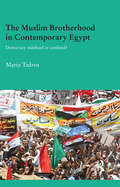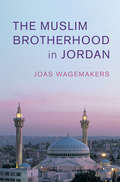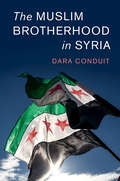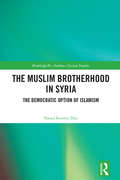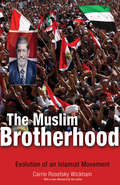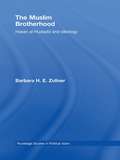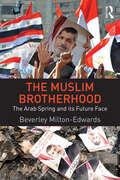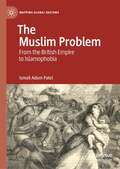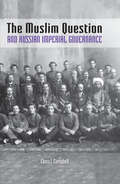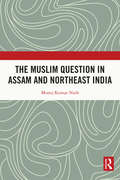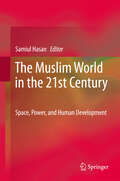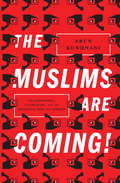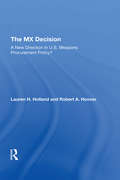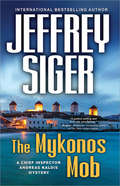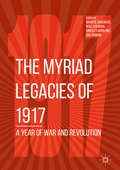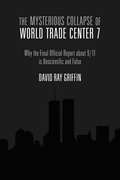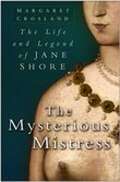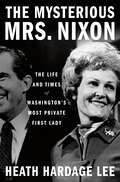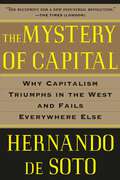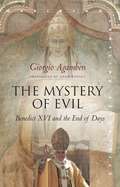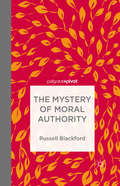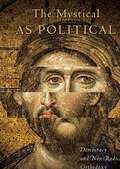- Table View
- List View
The Muslim Brotherhood in Contemporary Egypt: Democracy Redefined or Confined? (Durham Modern Middle East and Islamic World Series)
by Mariz TadrosThe Muslim Brotherhood is one of the oldest and most influential Islamist movements. As the party ascends to power in Egypt, it is poised to adopt a new system of governance and state–society relations, the effects of which are likely to extend well beyond Egypt’s national borders. This book examines the Brotherhood’s visions and practices, from its inception in 1928, up to its response to the 2011 uprising, as it moves to redefine democracy along Islamic lines. The book analyses the Muslim Brotherhood’s position on key issues such as gender, religious minorities, and political plurality, and critically analyses whether claims that the Brotherhood has abandoned extremism and should be engaged with as a moderate political force can be substantiated. It also considers the wider political context of the region, and assesses the extent to which the Brotherhood has the potential to transform politics in the Middle East.
The Muslim Brotherhood in Jordan (Cambridge Middle East Studies #60)
by Joas WagemakersSince its founding in 1945, the Jordanian Muslim Brotherhood has enjoyed decades of almost continuous parliamentary presence and state acceptance in Jordan, participating in elections, organising events and even establishing a hospital. In this detailed account of the Muslim Brotherhood's ideological and behavioural development in Jordan, Joas Wagemakers focusses on the group's long history and complex relationship with the state, its parliament and society. It shows how age-old concepts derived from classical Islam and the writings of global Islamist scholars have been used and reused by modern-day Jordanian Islamists to shape their beliefs in the context of the present-day nation-state. Far from its reputation as a two-faced global conspiracy bent on conquering the West, the Muslim Brotherhood is a deeply divided group that has nevertheless maintained a fascinating internal ideological consistency in its use of similar religious concepts. As such, it is part of, and continues to build on, trends in Muslim thought that go back hundreds of years.
The Muslim Brotherhood in Kuwait: 1941–1991 (Contemporary Gulf Studies)
by Ali A. AlkandariThe Muslim Brotherhood (MB) is the most influential, organized, social, and political movement in Kuwait. With the succession in Kuwait, the role of the organisation become more interesting for people interested in Kuwait and Gulf domestic politics as well as those interested in the MB and Political Islam. This book traces the emergence and development of MB while considering the political and social development of Kuwait that led to its appeal. It explains the evolution of MB’s organisational structure and how it adapted itself during different periods in Kuwait’s history through the Social Movement Theory. It describes MB policies and strategies during challenging times. It traces the circumstances surrounding the emergence of the MB and focuses on its development and its mobilisation strategy. It is certainly one of the first focused studies on MB from its conception in 1941 up to 1991.
The Muslim Brotherhood in Syria (Cambridge Middle East Studies #56)
by Dara ConduitHaving played a role in every iteration of Syrian politics since the country gained independence in 1946, the Muslim Brotherhood were the most prominent opposition group in Syria on the eve of the 2011 uprising. But when unrest broke out in March 2011, few Brotherhood flags and slogans were to be found within the burgeoning protest movement. Drawing on extensive primary research including interviews with Brotherhood members, Dara Conduit looks to the group's history to understand why it failed to capitalise on this advantage as the conflict unfolded, addressing significant gaps in accounts of the group's past to assess whether its reputation for violence and dogmatism is justified. In doing so, Conduit reveals a party that was neither as violent nor as undemocratic as expected, but whose potential to stage a long-awaited comeback was hampered by the shadow of its own history.
The Muslim Brotherhood in Syria: The Democratic Option of Islamism (Routledge/St. Andrews Syrian Studies Series)
by Naomí Ramírez DíazAnyone who follows world events has heard of the Muslim Brotherhood. Usually considered a fundamentalist religious organisation opposed to secular regimes, the so-called Arab Spring began to challenge this conception, and showed the MB’s commitment to democratic principles and elections, albeit with certain difficulties. Until now though, most analysis has focused on the Egyptian branch – the group that gave spiritual birth to the local branches in other countries – with very little having been studied about the Syrian Muslim Brotherhood, especially since the Hama massacre of 1982 and the formal disappearance of the group from Syria. This book provides a deep insight into the Syrian Muslim Brotherhood’s ideological evolution from its inception until present-day. Since Syria has unfortunately become the place where all forms of Islamism converge, understanding the SMB, their ideological evolution, and their potential role as moderating forces, is essential in order to debunk some clichés on the MB in general. Each chapter corresponds to a specific period in the SMB’s timeline, while the final chapter discusses how the endemic gerontocracy of the group calls for an urgent renovation of structures, and stresses the importance of younger generations in renovating the ideology of the SMB. Through the examination of original primary sources written by the SMB themselves, and relevant groups related to them, this book challenges the traditional categories applied to Islamist movements. It will therefore be a key resource for anyone studying Islamist movements, as well as for students and scholars of Middle East and North African Politics.
The Muslim Brotherhood, Its Youth, and Implications for U.S. Engagement
by Dalia Dassa Kaye Jeffrey Martini Erin YorkSince the 2011 revolution in Egypt, the Muslim Brotherhood has emerged as a key political player. Although individuals under the age of 35 make up a large share of the membership, the group's strict hierarchy has led to disaffection among its youth. These members merit attention not only as a challenge to the Brotherhood's organizational cohesion, but as a potential conduit for expanding U. S. engagement with the group.
The Muslim Brotherhood: Evolution of an Islamist Movement - Updated Edition
by Carrie Rosefsky WickhamHow the Muslim Brotherhood rose to power in Egypt, and what it means for the Islamic worldFollowing the Arab Spring, the Muslim Brotherhood achieved a level of influence previously unimaginable. Yet the implications of the Brotherhood's rise and dramatic fall for the future of democratic governance, peace, and stability in the region are disputed and remain open to debate. Drawing on more than one hundred in-depth interviews as well as Arabic-language sources never before accessed by Western researchers, Carrie Rosefsky Wickham traces the evolution of the Muslim Brotherhood in Egypt from its founding in 1928 to the fall of Hosni Mubarak and the watershed elections of 2011-2012. Highlighting elements of movement continuity and change, Wickham demonstrates that shifts in Islamist worldviews, goals, and strategies are not the result of a single strand of cause and effect, and provides a systematic, fine-grained account of Islamist group evolution in Egypt and the wider Arab world.In a new afterword, Wickham discusses what has happened in Egypt since Muhammad Morsi was ousted and the Muslim Brotherhood fell from power.
The Muslim Brotherhood: Hasan al-Hudaybi and ideology (Routledge Studies in Political Islam)
by Barbara ZollnerThe Muslim Brotherhood is one of the most influential Islamist organisations today. Based in Egypt, its network includes branches in many countries of the Near and Middle East. Although the organisation has been linked to political violence in the past, it now proposes a politically moderate ideology. The book provides an in-depth analysis of the Muslim Brotherhood during the years of al-Hudaybi’s leadership, and how he sought to steer the organization away from the radical wing, inspired by Sayyid Qutb, into the more moderate Islamist organization it is today. It is his legacy which eventually fostered the development of non-violent political ideas. During the years of persecution, 1954 to 1971, radical and moderate Islamist ideas emerged within the Brotherhood’s midst. Inspired by Sayyid Qutb’s ideas, a radical wing evolved which subsequently fed into radical Islamist networks as we know them today. Yet, it was during the same period that al-Hudaybi and his followers proposed a moderate political interpretation, which was adopted by the Brotherhood and which forms its ideological basis today.
The Muslim Brotherhood: The Arab Spring and its future face
by Beverley Milton-EdwardsThe Muslim Brotherhood is the most significant and enduring Sunni Islamist organization of the contemporary era. Its roots lie in the Middle East but it has grown into both a local and global movement, with its well-placed branches reacting effectively to take the opportunities for power and electoral competition offered by the Arab Spring. Regarded by some as a force of moderation among Islamists, and by others as a façade hiding a terrorist fundamentalist threat, the potential influence of the Muslim Brotherhood on Middle Eastern politics remains ambiguous. The Muslim Brotherhood: The Arab Spring and its Future Face provides an essential insight into the organisation, with chapters devoted to specific cases where the Brotherhood has important impacts on society, the state and politics. Key themes associated with the Brotherhood, such as democracy, equality, pan-Islamism, radicalism, reform, the Palestine issue and gender, are assessed to reveal an evolutionary trend within the movement since its founding in Egypt in 1928 to its manifestation as the largest Sunni Islamist movement in the Middle East in the 21st century. The book addresses the possible future of the Muslim Brotherhood; whether it can surprise sceptics and effectively accommodate democracy and secular trends, and how its ascension to power through the ballot box might influence Western policy debates on their engagement with this manifestation of political Islam. Drawing on a wide range of sources, this book presents a comprehensive study of a newly resurgent movement and is a valuable resource for students, scholars and policy makers focused on Middle Eastern Politics.
The Muslim Problem: From the British Empire to Islamophobia (Mapping Global Racisms)
by Ismail Adam PatelThis book explains the increasing incidences and normalisation of Islamophobia, by analysing the role of signifiers of free speech, censorship, and fatwa during the Satanic Verses affair in problematising the figure of the Muslim. Ismail Patel develops the notion of Islamophobia not as a continuation of the antagonistic relation from the British Empire but as a postcolonial reformulation of the figure of the Muslim. The book views Islamophobia studies as a paradigm, engages in the debate of Islamophobia as a global phenomenon, investigates the contestation over its definition and challenges the view of Islamophobia as a reserve of the far-right. It assesses the debate around the concept of identity and shows how the colonised figure of the Muslim provided significance in constructing British imperial identity. Providing a decolonial, counter-Islamophobia approach that challenges Britishness’ exclusionary white symbolic content, the book calls for a liberating idea of Britishness that promotes a post-racist rather than a post-race society. Theoretically rich in analysis, this book will contribute to discussions of identity formation, Britishness, Islamophobia and counter-Islamophobia. It will be of use to students and researchers across history, politics, sociology, cultural studies, literary studies, and anthropology.
The Muslim Question and Russian Imperial Governance
by Elena I. Campbell“A major contribution to the history of nationality, religious identity, and governance in late imperial Russia.” —William G. Rosenberg, coauthor of Processing the PastFrom the time of the Crimean War through the fall of the Tsar, the question of what to do about the Russian empire’s large Muslim population was a highly contested issue among educated Russians both inside and outside the government. As formulated in the nineteenth and early twentieth centuries, the Muslim Question comprised a complex set of ideas and concerns that centered on the problems of reimagining and governing the tremendously diverse Russian empire in the face of the challenges presented by the modernizing world. Basing her analysis on extensive research in archival and primary sources, Elena I. Campbell reconstructs the issues, debates, and personalities that shaped the development of Russian policies toward the empire’s Muslims and the impact of the Muslim Question on the modernizing path that Russia would follow.“Readable, original, and endlessly interesting, Campbell’s book deserves the very highest praise.” —Journal of Islamic Studies“Campbell’s book shows how profound official Islamophobia paradoxically led to the preservation of earlier confessional structures, grudging non-interference with the spiritual and social life of most Muslim communities, a restraining hand on the actions (if not the rhetoric) of Orthodox missionaries, and a certain uneasy toleration.” —Slavonic and East European Review“A major contribution to the understanding of Russia’s ‘Muslim Question’—past and present . . . Recommended.” —Choice
The Muslim Question in Assam and Northeast India
by Monoj Kumar NathThis book presents a systematic study of the transformation of the specific socio-political identity of the Muslims in Assam. It discusses the issues of Muslims under India’s ‘indigenous secularism’, Hindu nationalism and the rise of majoritarian politics; Muslim immigration into Assam after Independence; the Assam Movement and the shift of Muslims from being a vote bank to an autonomous force in the post-Partition politics of Assam; the role of Jamiat; and the divide between Assamese and the neo-Assamese. It explores the history and contemporary politics of the state to show how they shape the new context of Muslim identity in Assam, where previously an Assamese identity often prevailed over religious and linguistic identity. With the current debates on illegal immigration, the National Register of Citizens of India (NRC) and the Citizenship (Amendment) Act 2019, this book will be a timely addition to the existing literature on Muslim minority politics in Assam and northeast India. This book will be useful to scholars and researchers of political science, sociology, political sociology, minority studies, northeast India studies, demography and immigration studies, and development studies. It will interest those concerned with minority politics, communal politics, identity politics, migration, citizenship issues, and South Asian studies.
The Muslim World After 9/11
by Angel Rabasa Eric V. Larson Cheryl Y. Marcum Matthew WaxmanMomentous events since September 11, 2001-Operation Enduring Freedom, the global war on terrorism, and the war in Iraq-have dramatically altered the political environment of the Muslim world. Many of the forces influencing this environment, however, are the products of trends that have been at work for many decades. This book examines the major dynamics that drive changes in the religio-political landscape of the Muslim world-a vast and diverse region that stretches from Western Africa through the Middle East to the Southern Philippines and includes Muslim communities and diasporas throughout the world-and draws the implications of these trends for global security and U.S. and Western interests. It presents a typology of ideological tendencies in the different regions of the Muslim world and identifies the factors that produce religious extremism and violence. It assesses key cleavages along sectarian, ethnic, regional, and national lines and examines how those cleavages generate challenges and opportunities for the United States. Finally, the authors identify possible strategies and political and military options for the United States to pursue in response to changing conditions in this critical and volatile part of the world.
The Muslim World in the 21st Century
by Samiul HasanIslam is not only a religion, but also a culture, tradition, and civilization. There are currently 1.5 billion people in the world who identify themselves as Muslim. Two thirds of the worldwide Muslim population, i.e. approximately a billion people, live in forty-eight Muslim majority countries (MMC) in the world- all of which except one are in Africa and Asia. Of these MMCs in Africa and Asia, only twelve (inhabited by about 165 million people) have ever achieved a high score on the Human Development Index (HDI), the index that measures life expectancy at birth, education and standard of living and ranks how "developed" a country is. This means that the majority of the world's Muslim population lives in poverty with low or medium level of human development. The contributions to this innovative volume attempt to determine why this is. They explore the influence of environment, space, and power on human development. The result is a complex, interdisciplinary study of all MMCs in Africa and Asia. It offers new insights into the current state of the Muslim World, and provides a theoretical framework for studying human development from an interdisciplinary social, cultural, economic, environmental, political, and religious perspective, which will be applicable to regional and cultural studies of space and power in other regions of the world.
The Muslims Are Coming!
by Arun KundnaniDeath came instantly to Imam Luqman, as four FBI agents fired semiautomatic rifles at him from a few feet away. Another sixty officers surrounded the building on that October morning, the culmination of a two-year undercover investigation that had infiltrated the imam's Detroit mosque. The FBI quickly claimed that Luqman Abdullah was "the leader of a domestic terrorist group." And yet, caught on tape, he had refused to help "do something" violent, as it might injure innocents, and no terrorism charges were ever lodged against him. Jameel Scott thought he was exercising his rights when he went to challenge an Israeli official's lecture at Manchester University. But the teenager's presence at the protest with fellow socialists made him the subject of police surveillance for the next two years. Counterterrorism agents visited his parents, his relatives, his school. They asked him for activists' names and told him not to attend demonstrations. They called his mother and told her to move the family to another neighborhood. Although he doesn't identify as Muslim, Jameel had become another face of the presumed homegrown terrorist. The new front in the War on Terror is the "homegrown enemy," domestic terrorists who have become the focus of sprawling counterterrorism structures of policing and surveillance in the United States and across Europe. Domestic surveillance has mushroomed--at least 100,000 Muslims in America have been secretly under scrutiny. British police compiled a secret suspect list of more than 8,000 al-Qaeda "sympathizers," and in another operation included almost 300 children fifteen and under among the potential extremists investigated. MI5 doubled in size in just five years. Based on several years of research and reportage, in locations as disparate as Texas, New York, and Yorkshire, and written in engrossing, precise prose, this is the first comprehensive critique of counterradicalization strategies. The new policy and policing campaigns have been backed by an industry of freshly minted experts and liberal commentators. The Muslims Are Coming! looks at the way these debates have been transformed by the embrace of a narrowly configured and ill-conceived antiextremism.From the Hardcover edition.
The Mx Decision: A New Direction In U.s. Weapons Procurement Policy?
by Lauren H Holland Robert A HooverFocusing especially on the history of the MX program, this book examines the process of U.S. weapons procurement decision making. The authors demonstrate that strategic and general political factors (as opposed to bureaucratic concerns) play a far more decisive role in the decision-making process than is indicated in previous studies of weapons procurement. They also point to the significant contributions of congressional and public debate in influencing U.S. policy concerning weapons procurement. The authors conclude that the pattern of decision making with regard to the MX reflects a change that began in the 1970s and thus will be significant in explaining procurement policy in the decade ahead.
The Mykonos Mob (Chief Inspector Andreas Kaldis Mysteries #10)
by Jeffrey Siger"A perfect setting and first-rate storytelling." —Ragnar Jónasson, bestselling author of The Dark Iceland seriesWhen corruption lies deep beneath the surface, how can the truth come to light?The case begins for Athens' Chief Inspector Andreas Kaldis with a literal bang when a corrupt former police colonel who runs a protection racket on Mykonos is gunned down. Suddenly, Athens' Chief Inspector Andreas Kaldis is face-to-face with Greece's top crime bosses on an island whose natural beauty and reputation as an international playground belies the corruption lurking just beneath the surface.While Andreas and his Special Crimes unit wrestle for answers, Andreas's wife, Lila, meets an American expat named Toni, a finder of stolen goods and a piano player in a gender-bending bar who has a zest for life and no apparent regard for rules. As Lila and Toni bond over a common desire to mentor young island girls trapped in an exploitative and patriarchal culture, they soon find that their efforts to improve the lives of the Greek girls they've come to care about intersect with Andreas' investigation in ways that prove to be dangerous for all involved...International bestselling author Jeffrey Siger delivers another heart-stopping story of corruption and intrigue in The Mykonos Mob, the latest entry in the renowned Chief Inspector Andreas Kaldis mystery series.
The Myriad Legacies of 1917: A Year Of War And Revolution
by Maartje Abbenhuis Neill Atkinson Kingsley Baird Gail RomanoThis book explores the ramifications of 1917, arguing that it was a cataclysmic year in world history. In this volume, thirteen scholars reflect on the myriad legacies of the year 1917 as a year of war, revolution, upheaval and change. Crisscrossing the globe and drawing on a range of disciplinary approaches, from military, social and economic history to museum, memory and cultural studies, the collection highlights how the First World War remains ‘living history’. With contributions on the Russian revolutions, the entry of the United States into the war, the Caucasus and Flanders war fronts, as well as on India and New Zealand, and chapters by pre-eminent First World War academics, including Jay Winter, Annette Becker, and Michael Neiberg, the collection engages all with an interest in the era and in the history and commemoration of war.
The Mysterious Collapse of World Trade Center 7: Why The Final Official Report About 9/11 Is Unscientific And False
by David Ray GriffinAt 5:20 in the afternoon on 9/11, Building 7 of the World Trade Center collapsed, even though it had not been struck by a plane and had fires on only a few floors. The reason for its collapse was considered a mystery. In August 2008, NIST (the National Institute of Standards and Technology) issued its report on WTC 7, declaring that "the reason for the collapse of World Trade Center 7 is no longer a mystery" and that "science is really behind what we have said." Showing that neither of these claims is true, David Ray Griffin demonstrates that NIST is guilty of the most serious types of scientific fraud: fabricating, falsifying, and ignoring evidence. He also shows that NIST's report left intact the central mystery: How could a building damaged by fire-not explosives-have come down in free fall?
The Mysterious Mistress: The Life and Legend of Jane Shore
by Margaret CroslandJane Shore often gets just a byline in history. We know her name, and that she was the mistress of a king. But who was this woman caputred for the stage by Shakespeare in 'Richard III', fictionalised by Jean Plaidy and others? Where did she come from? And how was it that having been mistress to the most powerful man in the land, she ended her years in prison and poverty? Jane Shore was born into a family of merchants and was married early, to William Shore. Having already attempted to get her marriage annulled - citing William's impotence - once she became involved with Edward IV it was inevitable that her marriage was dissolved. She is said to have been a benign influence - 'where men were out of favour, she would bring them in his grace' wrote Thomas More - even intervening to save Eton College and King's College from destruction. When the king died, her position became very vulnerable. Sorcery, treason, penance, imprisonment, poverty, escape and execution were key elements in the rest of Jane's life. Margaret Crosland draws on literary, historical and artistic sources to explore Jane's life both before and after Edward's demise.
The Mysterious Mrs. Nixon: The Life and Times of Washington’s Most Private First Lady
by Heath Hardage LeeA new, revolutionary look into the brilliant life of Pat Nixon.In America’s collective consciousness, Pat Nixon has long been perceived as enigmatic. She was voted “Most Admired Woman in the World” in 1972 and made Gallup Poll’s top ten list of most admired women fourteen times. She survived the turmoil of the Watergate scandal with her popularity and dignity intact. The real Pat Nixon, however, bore little resemblance to the woman so often described as elusive, mysterious and “plastic” in the press. Pat married Richard Nixon in June of 1940. As the couple rose to prominence, Pat became Second Lady from 1953-1961 and then First Lady from 1969-1974, forging her own graceful path between the protocols of the strait-laced mid-century and the bra-burning Sixties and Seventies.Pat was a highly travelled First Lady, visiting eighty-three countries during her tenure. After a devastating earthquake in Peru in 1970, she personally flew in medical supplies and food to hard-hit areas, meeting one-on-one with victims of the tragedy. The First Lady’s 1972 trips with her husband to China and to Russia were critical to the detente that resulted. Back in the US, Pat greatly expanded upon previous preservation efforts in the White House, obtaining more art and antique objects than any other First Lady. In the domestic arena, she was progressive on women’s issues, favoring the Equal Rights Amendment and backing a targeted effort to get more women into high level government jobs. Pat strongly supported nominating a woman for the Supreme Court. She was pro-choice, supporting women’s reproductive rights publicly even before the landmark Roe v. Wade case in 1973.When asked to define her “signature” First Lady agenda, she defied being put into a box, often saying: “People are my project.” The Mysterious Mrs. Nixon, Heath Hardage Lee presents readers with the essential nature of this First Lady, an empathetic, adventurous, self-made woman who wanted no power or influence, but who connected warmly with both ordinary Americans and people from different cultures she encountered world-wide.
The Mystery of Capital: Why Capitalism Triumphs in the West and Fails Everywhere Else
by Hernando De Soto"The hour of capitalism's greatest triumph," writes Hernando de Soto, "is, in the eyes of four-fifths of humanity, its hour of crisis." In The Mystery of Capital, the world-famous Peruvian economist takes up the question that, more than any other, is central to one of the most crucial problems the world faces today: Why do some countries succeed at capitalism while others fail?In strong opposition to the popular view that success is determined by cultural differences, de Soto finds that it actually has everything to do with the legal structure of property and property rights. Every developed nation in the world at one time went through the transformation from predominantly informal, extralegal ownership to a formal, unified legal property system. In the West we've forgotten that creating this system is also what allowed people everywhere to leverage property into wealth. This persuasive book will revolutionize our understanding of capital and point the way to a major transformation of the world economy.
The Mystery of Evil: Benedict XVI and the End of Days
by Giorgio Agamben Adam KotskoIn 2013, Benedict XVI became only the second pope in the history of the Catholic Church to resign from office. In this brief but illuminating study, Giorgio Agamben argues that Benedict's gesture, far from being solely a matter of internal ecclesiastical politics, is exemplary in an age when the question of legitimacy has been virtually left aside in favor of a narrow focus on legality. This reflection on the recent history of the Church opens out into an analysis of one of the earliest documents of Christianity: the Second Epistle to the Thessalonians, which stages a dramatic confrontation between the "man of lawlessness" and the enigmatic katechon, the power that holds back the end of days. In Agamben's hands, this infamously obscure passage reveals the theological dynamics of history that continue to inform Western culture to this day.
The Mystery of Moral Authority
by Russell BlackfordThe Mystery of Moral Authority argues for a sceptical and pragmatic view of morality as an all-too-human institution. Searching, intellectually rigorous, and always fair to rival views, it represents the state of the art in a tradition of moral philosophy that includes Thomas Hobbes, David Hume, and J.L. Mackie.
The Mystical as Political
by Aristotle PapanikolaouTheosis, or the principle of divine-human communion, sparks the theological imagination of Orthodox Christians and has been historically important to questions of political theology. In The Mystical as Political: Democracy and Non-Radical Orthodoxy, Aristotle Papanikolaou argues that a political theology grounded in the principle of divine-human communion must be one that unequivocally endorses a political community that is democratic in a way that structures itself around the modern liberal principles of freedom of religion, the protection of human rights, and church-state separation. <p><p>Papanikolaou hopes to forge a non-radical Orthodox political theology that extends beyond a reflexive opposition to the West and a nostalgic return to a Byzantine-like unified political-religious culture. His exploration is prompted by two trends: the fall of communism in traditionally Orthodox countries has revealed an unpreparedness on the part of Orthodox Christianity to address the question of political theology in a way that is consistent with its core axiom of theosis; and recent Christian political theology, some of it evoking the notion of “deification,” has been critical of liberal democracy, implying a mutual incompatibility between a Christian worldview and that of modern liberal democracy. <p><p>The first comprehensive treatment from an Orthodox theological perspective of the issue of the compatibility between Orthodoxy and liberal democracy, Papanikolaou’s is an affirmation that Orthodox support for liberal forms of democracy is justified within the framework of Orthodox understandings of God and the human person. His overtly theological approach shows that the basic principles of liberal democracy are not tied exclusively to the language and categories of Enlightenment philosophy and, so, are not inherently secular.
